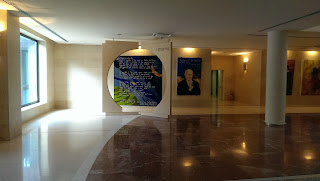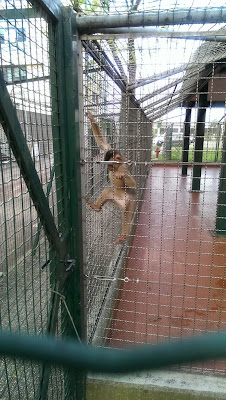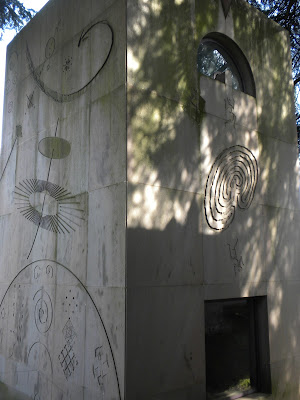Yesterday I crossed the river and went up to the castle. I didn't get there as early as my guidebook recommended, but I also took a different tram and ended up coming in the back entrance - luckily this meant there was no line to go through security. The castle itself is amazing, but the best feature is the St. Vitrus cathedral. Part of it is incredibly old, but part of it was finished in the beginning of the 1900's, so there is some amazing stained glass windows in a modern style.
Near the castle is an old monastery, which had an incredible library. Unsurprisingly, I visited the library. You can only view the rooms from the door, unless you book a private tour ahead of time. If/when I come back to Prague in the future, I will make sure to do that! Also, I bought some monastery-made herbal tea at the library gift shop... I am very proud of myself every time that I do not buy tea somewhere, but eventually I give in. And Prague is an amazing city for tea!
Today was my last day in Prague - I had a few major sights left, but had to battle with things being closed on Sunday. I had 3 major things on my to-do list for today: first up, an Alchemy museum. Interestingly, this wasn't mentioned in my guidebook, but it was praised by the guide to my Jewish Museum tour. Basically, there was an old (circa 800) house in the Jewish quarter that had somehow survived... and then during the flood in 2002, a huge hole opened up in the road in front of it. Inside was an alchemy lab, along with tunnels leading all over the city. The rest of the stories told would be hard to believe, if I wasn't standing underground... in an alchemy lab. The museum only opened in 2012, and was really so awesome that it is difficult for me to believe it.
Returning to the Day 1 theme of "history shows everything is terrible", I then went to a museum dedicated to the Heros of the Heydrich Terror. This is in a crypt of an Orthodox cathedral, further away from the tourist area. The museum traces out a little bit of WWII history, focusing on the mission of two Czech paratroopers (trained by the British) who came to Prague to assassinate Reinhard Heydrich. They were successful, but thousands of Czechs - including an entire town - were subsequently executed. The paratroopers, and other Czech resistance fighters, had been hiding in the crypt of this church. They were betrayed and a major gun fight occured here - they either died from Nazi bullets or their own. The church wall is one of many places in Prague where you can see where an oppressive government murdered people.
I then headed to the Charles Bridge, which has a variety of lovely statues and many, many tourists. This put me into the Little Quarter, on the other side of the river - and I realized why 3 days is the minimum to "do Prague". I had skipped a number of major sights in the parts of the city I had been in already, and here was another huge chunk of the historic/tourist city I hadn't seen yet! I wandered a bit and found a watchtower to climb. The lower floors were used as living quarters for the watchman, and there were nice historical displays set up there. I thought I had reached the "top" a few times, but then there kept being more stairs. Not only did the actual top level provide beautiful views, but it was used for communist spying.
Compared to my usual travel style, I've seen the inside of very few churches in Prague. They have typically either been closed, or in the process of religious services. Luckily, The Chuch of St Nicholas (next to the tower) was open. This church was incredible - especially the marble. My brain struggles to except that stone can actually look like that, and that the walls are not just covered in some sort of laminate. I'm finally starting to pick up on some architectural terms and styles. This church was definitely Baroque - Prague has many Baroque churches, which I rarely see in Italy.
At this point, my "to do" list was wrapped up. I tried, once more, to get into the Tyn church... but it was closed. I stopped in the ticket office next to it and bought a ticket for a music concert. Many of the churches and historic buildings have classical music concerts - there probably half a dozen every day. I picked the concert that involved a pipe organ and Bach's Tocatta and Fugue in D minor. The concert was in a church I hadn't found yet, and I had a little over an hour to get there. I swung by St. James' church and found it open for the first time (it was also Baroque), and then started weaving through some very touristy streets until I got to St. Giles' cathedral.
The concert was lovely, and I'm very glad I did it. Half of the songs were on pipe organ, the other were string quartet. All of the musicians were very talented, and the program was the "Classical Music Greatest Hits" type of program that is frequently done here. I don't need to be a hipster when it comes to classical music, I enjoy Mozart and Bach. The church was a bit smaller than some of the others, also Baroque, and was used in scenes in the movie Amadeus. Luckily, they were aware of how cold the church is and provided blankets and heated pads on the pews (which date from the 1600s).
Prague has been incredible. Much of the touristy parts feel like Disney Land - there are lines, and too many people, and a feeling that one must see/do/eat all there is. I've heard tours given in French, Italian, Spanish, English, and many Slavic languages that I cannot distinguish. As ridiculous as the crowds are (and it is freezing out!), it is hard to fathom it being any other way. Even beyond the castles and churches, every single building is beautiful. I'm not particularly into architecture (and know nothing about it), but I could spend days simply wandering around and looking up at the buildings.
At some point I will post some pictures, and likely reflect a little more on Prague. I'm not going to assume I "know" Eastern Europe after seeing only one city, but this has (in part) satisfied my desire to see Eastern Europe. I've seen evidence and history from WWII in France and Italy, but not like here. I've gone in churches from Christian denominations that I've never heard of before, sometimes the same church being passed through different religious groups. I still can't quite understand how Prague can be what it is right now, when 3 decades ago communist tanks rolled through the streets.
This was a very good trip, but it is time to return to Milan and get back to work. While being here, I've felt a bit disconnected from everything in Italy (maybe due to the language change) and have thought a lot about what the months after my leave will bring. I'm halfway through my time in Europe, but Prague feels like the grand finale. I will certainly do a little more traveling, but I don't know if I can do another city.

































